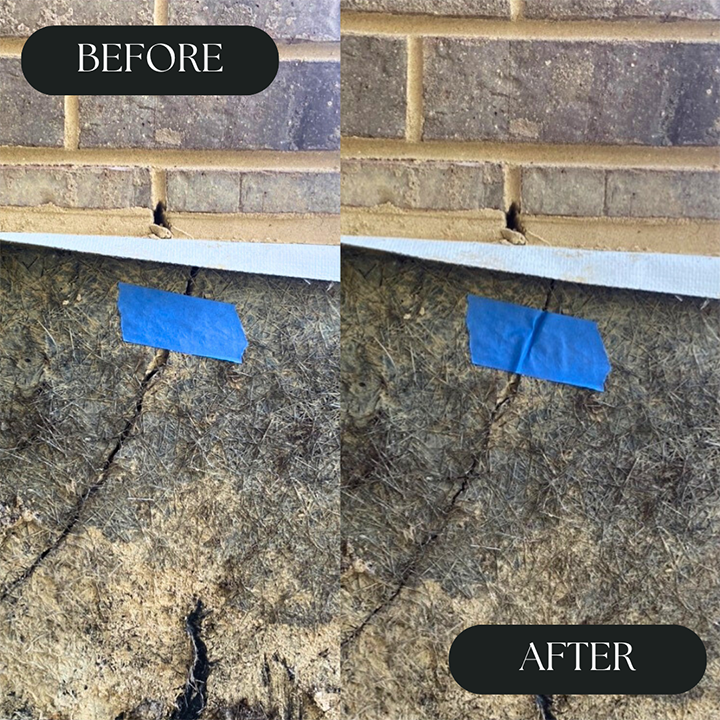Most home foundations tend to crack over time, so much so that many homeowners have come to expect — and ignore them. In fact, even newly constructed homes can begin to show cracks within a year of completion.
While a hairline crack shouldn’t send your blood pressure soaring, it could be pointing to a much larger issue — and one that can cause a considerable impact to your pocketbook if you don’t address it right away.
When cracks are an indicator of something wrong, the faster the issue is addressed, the easier — and cheaper — the repair. Waiting too long can not only cost you more, but it can also reduce the options you have to take care of the issue.
So, let’s dive right in and discover what foundations cracks are and why you should get them repaired.
Foundation Cracks: What are They and Why Should I Repair Them?
Your foundation supports the rest of your house and keeps it upright, supporting the load of the whole building. A good foundation will keep your home supported through storms, strong winds, and other forces of nature.
To do its job well, however, it is critical that your foundation is maintained to keep moisture from seeping in, as this could weaken the entire structure and damage your interior.
That brings us to foundation cracks:
1. Causes of Foundation Cracks?
Foundation cracks are fissures that extend all the way through the concrete. They form a pathway from the exterior directly to the interior of the home. Foundation cracks can be caused by a number of factors, from the relatively benign to the downright dangerous.
Here are a few things that could be going on if you’re seeing cracks in your foundation:
- Shrinkage from concrete drying
- Drought or excess moisture
- Chemical reactions
- Weathering, which involves heating and cooling and is linked to thermal stresses
- Corrosion of steel reinforcing inside the foundation
- Poor construction practices
- Construction and structural overloads
- Errors in design and detailing
- Externally applied loads
- Poor loading and storage practices
Problems caused by foundation cracks range from leaks that can lead to flooding, damage, and mold overgrowth to structural damage, uneven floors, doors and windows that won’t open, damage to plumbing, and even termite infestation.
2. What Those Foundation Cracks are Telling You
Each type of foundation crack is giving you a clue as to what is causing it. These clues will help you pinpoint the underlying cause behind those cracks in your foundation.
Vertical cracks — A vertical crack that is small and doesn’t change in width over time is typically due to the shrinkage that occurs as your concrete foundation dries. It should be monitored and injected with professional grade water-resistant epoxy or polyurethane.
Diagonal cracks — Many times, diagonal cracks indicate that the basement wall is being pushed inwards. This type of crack is showing possible wall movement due to differential settlement, meaning some parts of your home are settling faster than others. Homes built on hills or homes where soil conditions are deteriorating are prone to these cracks.
No matter what the cause, differential settlement can cause serious structural problems in your home and these cracks will always require a professional inspection. A qualified basement contractor can help repair these cracks to stop future movement and may recommend foundation piers for further stabilization.
Horizontal cracks — These typically indicate a serious structural issue. Most often, they occur when pressure from the outside soil strains the foundation and causes it to bow inward. This pressure can be the result of frost heave, heavy equipment, improper landscape grading, poorly maintained gutters, or failure of structural rebar among other things.
As with diagonal cracks, the appearance of horizontal cracks always requires inspection by a qualified professional.
3. I’ve Got Cracks — Why Should I Repair Them?
Every crack — even the hairline ones — should be repaired. Why? Because even a hairline crack can let in moisture, which will eventually widen the crack and undermine your foundation.
Your home and family are your most important investment — take care of both by ensuring the foundation of your home is in good structural shape. Sealing all foundation cracks is one way to preserve the integrity of your home’s foundation and reduce the chance of bigger problems down the line.
Besides all the other problems we’ve mentioned, foundation cracks can lead to the development of black mold, which can adversely affect your family’s health causing mycotoxicosis, headaches, bleeding, allergies, and even dementia.
Trust Atlas to Help Secure Your Foundation for Years to Come
Sealing foundation cracks — even hairline ones — should never be a DIY project.
First, you may misunderstand the underlying reason for the cracks you’re seeing and use a substandard fix. While you may get short-term relief, you may end up with a large — and dangerous — problem in the long run.
Second, many of the materials and techniques used to repair cracks are only available to industry professionals and you could cause yourself — or your family — injury if you try to work with structural elements of your home.
At Atlas, we have the right expertise and knowledge to assess your foundation cracks and provide the most cost-effective solution to correct the issue and keep those cracks from costing your money — and sleep — down the line.
Not only will our team of professionals find the root cause of those cracks, but we can provide a permanent repair for security and peace of mind. Best of all, most of our crack repairs come with a fully transferable lifetime warranty.
Have cracks? Don’t panic. Call Atlas Restoration at 847-415-9600 for a free consultation.

